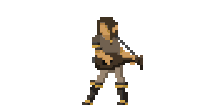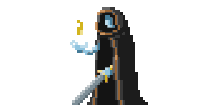In Social Justice Warriors, you’re on the front lines of arguing on the Internet. From behind a keyboard, you take on the horde of racist, sexist trolls who turned the term ‘social justice warrior’ into an attack on anyone who advocates for better gender and racial politics in video games. With the game’s debut on the popular Steam computer game platform in February, it’s now in front of a much larger audience. So I gave it a try.
Social Justice Warriors sounds pretty clear-cut. You fight with trolls one-by-one, lowering their sanity and reputation with arguments and personal attacks, while trying to keep your own sanity and reputation from dropping too low and forcing you to log off. They attack with all-too-real troll arguments, things like “if he didn’t want to get shot, he shouldn’t have dressed like that.” It’s enough to get your blood boiling.
That’s when you start considering a personal attack. You’ve been sticking to reasoned arguments so far, but this troll clearly isn’t going to listen. You fling a personal attack, bringing the troll’s sanity and reputation way down, but it takes some of your reputation down with it. You don’t look good mud-slinging either, even when it’s for a good cause. That conflict, between wanting to take down the vile trolls at any cost, and preserving your own mental health and good name, is the one that animates Social Justice Warriors. You always have the option to make a more effective personal attack, but it will always come at a cost. Do you avoid personal attacks entirely? Bring them out only when you’re in a tough spot? Or do you immediately take the fight to the gutter?

The game’s creator, Eric Ford, told ThinkProgress via email that dilemma is central to the game experience. “The game’s very first menu offers the choice to ‘Battle for Social Justice’ or ‘Don’t Battle for Social Justice’,” he said, “questioning whether the conflict should even be viewed as warfare or fought at all.” Choosing not to fight exits the game. If you choose to continue, you’ll get to pick a class.
As a social justice paladin, typically a sort of righteous holy warrior in video games, you can “dismember their claims with your logic,” rebroadcast their message to be attacked by others, or go for the personal attack. As a mage, a class that fights with magic in other games, you blog about the perils of injustice and write rebuttals. As a rogue, typically a sort of sneaky thief, you believe that all is fair in the fight against the trolls, so all of your attacks involve character assassination and backstabbing.
Ford says that temptation is purposeful. “There’s always a danger of things escalating into an us-vs-them conflict where disproving your opponent — winning — takes precedence over principles,” he said. “The game’s high score table encourages you to defeat more and more trolls, adding to the temptation to use your character’s own ad hominem attacks to dispatch trolls more quickly.”
It’s odd to say about a game, but Social Justice Warriors is at its best when it frustrates the player and makes them uncomfortable. For one thing, there’s no winning the game. The trolls will keep coming as long as you’re willing and able to fight them. “Once you’ve embarked down the path of correcting every incorrect statement an anonymous stranger is making online,” Ford said, “the only inevitable outcomes are that your patience is exhausted by frustration, your reputation is obliterated by the trolls’ defamation or your own actions, or you give up in disgust.”

While Ford has insisted the game isn’t pro- or anti-social justice warrior, his political sympathies are clear enough in the game. “We already ended racism like 40 years ago,” the troll says. “If you don’t think female privilege is real, you’re the real sexist.” They’re both laughably ridiculous, and sadly the kind of thing right wing trolls actually say. Your rebuttals are typically well-reasoned and sensible — at least until the trolls wear your sanity down.
You might expect that it would be cathartic getting to obliterate trolls in a controlled environment, but for me, the futility was overwhelming. Defeat a troll, and you’ll get a small boost to your own sanity and reputation. Then a new troll who looks exactly the same (and exactly the same as you) pops up a second later. That all contributes to a pretty short play time. Once you’ve tried out the classes and seen a good portion of what the game has to offer, it’s probably been a half hour or an hour. But for $7.99 on Steam, or less when it’s on sale, it’s worth trying out.
Social Justice Warriors excels at something only games can really do. It puts you in a position where you have to think and act like someone else, where you’re subject to the same temptations and lack of options they have. In that way, it reminds me of Papers, Please, where you’re the immigration inspector in a repressive state, forced to decide regularly between human decency and doing your job to feed your family. It also reminds me of Cart Life, where you play a street vendor struggling to get by, and the game really makes you feel every screw up as you spiral into poverty.
Despite Social Justice Warrior’s sense of futility for players, it isn’t “intended to suggest that racist, sexist, or other offensive comments shouldn’t be confronted online,” Ford said. The goal is to encourage critical thinking on how it can be done more effectively, and at less cost to the real-world social justice warriors. Social Justice Warriors doesn’t have an answer to the question of what that would look like, but it does encourage us to try and figure it out.
